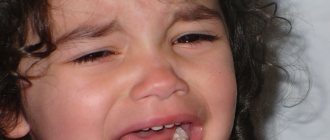Currently, there are three main types of pathology:
- Motor or expressive alalia. This is the child's inability to produce sounds. The child understands all words and can show their meaning with gestures. But the pronunciation is missing.
- Sensory or impressive alalia manifests itself in the fact that the baby does not perceive extraneous speech. He can speak without perceiving the speech addressed to him as if on his own.
- Sensorimotor, mixed alalia, has the characteristics of the two above in different proportions.
In sensorimotor alalia, the entire sensorimotor area of the cerebral cortex is affected. Sick children not only do not understand what their parents say, but they also cannot speak. This form of pathology is sometimes called total. Often, a child with total alalia cannot speak at all. In 100% of cases, the disease is accompanied by intellectual retardation. This disease is the most difficult to treat, and even an integrated approach sometimes does not guarantee a positive prognosis.
Symptoms
Sensorimotor alalia represents the immaturity of speech functionality at a fairly deep level. In most cases, it is possible to diagnose the problem in preschool age, when it is possible to correct its development and provide the child with a normal subsequent life.
The disease may be systemic or widespread. In other words, the violation affects all components of speech at once and manifests itself quite specifically.
There are several signs that become most typical for sensorimotor alalia:
- Minimum vocabulary.
- Late formation of speech functionality.
- Inarticulate pronunciation, problems with pronunciation.
- Problems of syllabic structure.
The pathology has a pronounced manifestation. The symptoms of the problem are represented by various manifestations. Among the main ones are:
- Problems with coordination.
- Fine motor defects.
- Awkwardness.
- Problems with self-care, such as buttoning buttons or tying shoelaces.
- Impaired attention, reaction, memory, concentration.
- Hyperactivity or inertia and increased fatigue depending on the child and the nature of the injury.
- Understanding someone else's speech, but not the ability to perform independent speech.
- Delay in the formation of speech skills.
- Inability to repeat after other people.
- Stuttering.
- Articulation problems.
- Small vocabulary.
Neurological manifestations can also be identified. This may be a lack of understanding of the addressed speech, high speech activity, but the baby speaks his “own” language, severe violations of phonemic hearing.
Alalia: the child doesn’t want to talk or can’t?
Authors : Koval Irina
“He’s so smart, he understands everything! But he doesn’t want to talk!” This phrase can often be heard from grandparents and mothers on playgrounds. Such children aged 2 to 4 years often play silently in the sandbox, ride on swings, scooters or bicycles. And they are silent, they don’t utter a word all day. Every year the number of non-speaking children increases. What is this? Reluctance to talk? Or maybe there is a problem that needs to be solved?
The absence of speech (when the child does not even pronounce individual words) or its underdevelopment (the vocabulary is no more than 15 words) is called alalia. In speech therapy correction work, alalia ranks second in frequency among all speech disorders.
Alalia symptoms
With alalia, the child’s speech appears later than generally accepted norms. The baby's vocabulary is very small, no more than 10–15 words. Speech contains agrammatisms - incorrectly constructed sentences, incorrectly formed words, because with alalia the child experiences difficulty constructing and perceiving sentences. Very often, the baby violates the syllabic and sound structure of words (characteristic by rearrangement, omission or addition of extra sounds and syllables), and his phonemic processes are also disrupted (phonemic hearing, perception, ideas, analysis and synthesis of speech). Sound pronunciation (the process of forming speech sounds) also suffers.
The statistics of the violation are as follows: on average, alalia is recorded in every fourteenth preschool child and in 0.6% of children of primary school age. Moreover, alalia is more often observed in boys.
Causes of alalia
Alalia is a clinical diagnosis. It is diagnosed by a neurologist if the child is completely speechless by the age of three. If the baby speaks, but has a very small vocabulary (up to 15 words) and sound pronunciation is impaired, these are signs of general speech underdevelopment (GSD) or delayed speech development (SDD).
There are many reasons that contribute to the occurrence of alalia. They can affect a child at different periods of his life. Let's get acquainted with them.
For example, during intrauterine development, subsequent alalia can be triggered by the following factors:
- fetal hypoxia;
- intrauterine infections;
- toxicosis;
- threats of abortion, etc.
Alalia can be the result of such complications during childbirth:
- asphyxia;
- intracranial birth injury;
- premature, rapid or prolonged labor.
In the first year of a baby’s life, factors provoking alalia may include:
- TBI (traumatic brain injury);
- frequent acute respiratory viral infections and pneumonia;
- operations under general anesthesia;
- deficit of speech contacts.
Very often, children with alalia exhibit a number of factors that lead to MMD (minimal cerebral dysfunction). And this, in turn, limits the child’s independent speech development capabilities.
If you have a history of at least one of the above factors, do not waste precious time. Seek advice from specialists - a speech therapist and a neurologist.
A qualified speech therapist provides consultations to children as young as one year old. The sooner this speech disorder or tendency towards it is identified, the easier it will be to correct it.
At the moment, speech therapists distinguish three types of alalia:
- motor alalia (expressive) - the child understands the speech of others, but his own, independent speech does not develop;
- sensory alalia (impressive) - the baby does not understand the speech of others, even if the child’s hearing is normal;
- mixed (sensorimotor or motosensory, in which a violation of the development of impressive or expressive speech predominates).
Motor alalia
Motor alalia by both non-speech (neurological and psychological) and speech manifestations.
Neurological symptoms include:
- awkwardness, stiffness of movements;
- poor coordination of movements;
- underdevelopment of fine motor skills (fastening and unfastening buttons and zippers, lacing shoes, folding puzzles, mosaics).
On the psychological side, children with motor alalia have the following disorders:
- memory (mostly auditory);
- attention;
- perception;
- emotional-volitional sphere.
There are also behavioral features. Children can be either very active or sedentary and inhibited. They get tired quickly, their level of performance is reduced. Children with motor alalia are more likely to have verbal negativism.
Children with alalia also often suffer from intellectual development. This occurs due to insufficient speech development. If you engage in its development, the baby’s intellectual capabilities develop and return to normal.
With motor alalia, the stages of development of speech skills usually occur with a delay.
Humming, babbling, babbling monologue, the appearance of words, phrases, and contextual speech are observed in such children later than generally accepted norms.
From the speech therapy side, there are no problems with impaired mobility of the speech apparatus. In this area, sound pronunciation suffers. The baby can replace and also mix sounds that sound controversial. This is expressed in the fact that the child cannot repeat the sound image of the word. That is, there is a distortion of the syllabic structure of the word (rearrangement, omission or addition of extra sounds and syllables).
The child’s vocabulary, which does not correspond to the age norm, also suffers. A small vocabulary is due to the fact that the child does not understand the meaning of words, often uses them inappropriately, and replaces words based on sound similarity. New words are difficult to learn. In the child's vocabulary, nouns in the nominative case most often predominate. The use of other parts of speech is sharply limited. Later, great difficulties arise in the formation and differentiation of grammatical forms.
Phrasal speech is limited to simple, short sentences, usually one- or two-part. With alalia, it is very difficult for children to consistently describe events that are happening or have occurred. Also difficult are the moments of identifying the main and the secondary, conveying the meaning of events, and determining temporary connections.
Most often, children with motor alalia have only onomatopoeia. sometimes individual babbling words, which are accompanied by active facial expressions and gestures.
A neurologist, psychologist and speech therapist will help you cope with this speech disorder. The sooner parents turn to specialists for help, the faster and better the correction of this disorder in the child will take place.
Sensory alalia
In children with sensory alalia, the perception and understanding of the meaning of speech that is directed at them is impaired.
At first glance, it may seem that the child simply does not hear you. There is no reaction to speech at all. The baby treats words addressed to him as meaningless noise. Often there is no reaction to one's name. At the same time, the baby’s physiological hearing is in perfect order.
Also, with sensory alalia, a child may suffer from hyperacusis - increased sensitivity to various quiet sounds (rustling, creaking, squeaking).
Interestingly, speech activity in children with sensory alalia is high. But their speech is a collection of meaningless sound combinations, fragments of words. Speech is incoherent, incomprehensible to others, because it is devoid of meaning. The baby can repeat a new, unfamiliar word several times in a row.
In addition to repeating words, such children can:
- repeat sounds and syllables;
- skip syllables in a word;
- combine parts of different words into one whole;
- make sound changes.
Let's consider the example of sensory alalia. If the child nevertheless understands the meaning and significance of the phrase addressed to him, then the understanding immediately disappears if the order of words or the pace of speech in it is changed. When communicating with such a child, you need to consider the following: if the baby looks at the speaker, he understands his speech better. Such children seem to “read lips.”
In practice, sensory alalia in its pure form, fortunately, is rare, because such children need long-term and targeted correctional work. This requires the help of a neurologist, speech therapist and psychologist. The joint work of specialists will yield results faster - the child’s mastery of speech. Therefore, do not delay solving the problem of a non-speaking child and start correcting it as early as possible.
published 07/22/2019 15:37 updated 07/22/2019 — Pedagogy and psychology, Growth and development, Nervous, mental and psychological diseases, Neurology and psychiatry, Special children and their families, Speech development
Causes
Sensorimotor alalia can develop in the antenatal, intranatal and early periods of child development up to the age of three. Accordingly, specific provoking factors are directly related to the process of formation and growth of the child’s body at different stages of his life.
In the antenatal or intranatal period, the disease can develop against the background of the following factors:
- Threats of spontaneous termination of pregnancy (miscarriage);
- Intrauterine infection with microorganisms of the TORCH complex;
- Prolonged and severe fetal hypoxia (such a disorder can be associated not only with obstetric pathologies, but also with exogenous factors such as maternal smoking, etc.);
- Severe toxicosis;
- Falls of a pregnant woman associated with injury to the fetus;
- Somatic diseases of the expectant mother in a chronic form (this category includes hypotension, hypertension, heart failure and other systemic pathologies of a permanent type).
The development of complicated sensorimotor alalia with autistic features can also occur in the perinatal period, i.e. at delivery. Typically, pathological processes in this case are associated with intracranial birth injuries, prematurity and asphyxia of newborns.
Disturbances in the cerebral cortex also often occur against the background of too transient, rapid natural childbirth, or in the opposite case, when a woman gives birth for too long. This occurs less frequently when using instrumental obstetric aid, including delivery by cesarean section.
If we talk about the development of the disorder in the first years of a baby’s life, it can be triggered by meningitis, encephalitis and head injury.
Diagnosis of sensory alalia in children
Due to the diversity of the causes and mechanisms of development of the pathology, the diagnosis of sensory alalia consists of two parts: a medical examination and a psychological and pedagogical consultation. The medical part is aimed at identifying organic brain damage, neurological, mental disorders, diseases of the ear, nose and throat, which are characterized by lack of speech.
The examination is phased and includes:
- Neurological research methods - examination by a neurologist, analysis of the course of pregnancy in the mother, childbirth and the early postpartum period. The doctor examines the child’s outpatient record, specialist reports in the first year of life, and identifies previous diseases. Looks at the results of analyzes and instrumental research methods. If necessary, the neurologist prescribes skull radiography, echoencephalography, electroencephalography, MRI or CT scan of the brain;
- Examination by an ENT doctor to exclude organic damage to the organ of hearing and congenital deafness. Audiological diagnostics, audiometry, and tympanometry are performed. The child is cared for by an otorhinolaryngologist, and sometimes an audiologist is involved;
- Consultation with a speech therapist is one of the important parts of diagnosing sensory alalia. The specialist comprehensively studies the characteristics of speech, identifies early speech and neuropsychic development. Evaluates impressive speech, that is, speech understanding. The specialist gives simple commands that the baby must follow: show an object, make some movement, repeat syllables or words. These methods allow the speech therapist to understand the nature of the disorders;
- A consultation with a psychologist is necessary to assess the state of auditory-verbal memory, the baby’s behavior, and identify deficits in mental functions. Based on the obtained picture, the specialist determines the tactics for managing the patient.
In most cases, several consultations with specialists are required. This is due to the variability of the clinical picture with sensory alalia: sometimes the child easily gives in to contact, sometimes he refuses to communicate.
Also, the difficulty of diagnosis is associated with the need to exclude other speech disorders and mental disorders. For example, it is necessary to exclude autistic disorders, sensorineural hearing loss, aphasia, and mental pathology.
Treatment
Treatment is carried out in several directions.
Speech therapy exercises. Can be carried out individually or within a special school. Positive results are achieved only by systematic, long-term training.
Under the guidance of a speech therapist, the child gradually masters the pronunciation of individual syllables and words and recognizes speech by its sound. With the help of various pictures, the skills of linking them with specific words are acquired.
When certain progress has been made, the child is already able to name one or another object shown in the picture. Gradually, the baby masters the correct endings of words, cases and declensions.
Additionally, classes are conducted that develop fine motor skills using drawing, modeling, cutting, and construction toys.
The success of treatment largely depends on home exercises. Exercises conducted with a speech therapist should be constantly reinforced with the direct participation of parents.
Speech therapy massage. Considered an effective addition to exercise. It develops individual muscles of the oral cavity responsible for correct pronunciation. The procedure is performed manually or using a special probe. Additionally, speech muscles are developed with the help of specific exercises designed specifically for these purposes.
Physiotherapeutic procedures. They are prescribed in the form of specific courses, depending on the child’s condition. They can be supplemented with hydrotherapy, magnetotherapy, laser therapy and other procedures.
Reflexology. Its essence is to stimulate the necessary areas of the brain with electrical impulses. This leads to the formation of new neural connections that facilitate learning. Applies to children over 9 years of age.
Drug therapy. Includes the use of drugs that stimulate blood flow to the brain. Additionally, vitamins B12 and B15 are prescribed. Much attention is paid to a balanced diet.
Prognosis and prevention
The prognosis for sensory alalia depends on the timeliness of starting therapy. With a mild degree of impairment, active participation of parents in correction, and regular classes with a speech therapist, the result will be good. Speech disorders are eliminated and complications are prevented. The child acquires communication skills, communicates freely with peers, and can master the school curriculum.
With late treatment and lack of proper attitude on the part of parents, lack of regularity of classes, recovery is in question, unfortunately.
Prevention of sensory alalia
Prevention of speech disorders, as well as other health problems, begins at the stage of pregnancy planning. A woman needs to undergo diagnostics to identify health problems. Then correct the detected violations. Only after this can you plan to conceive.
During pregnancy, it is important to follow the doctor’s recommendations: undergo examinations and tests on time. If necessary, take medications and vitamins. Lifestyle and nutrition play an important role - a pregnant woman and her unborn baby need food rich in vitamins and microelements, adequate sleep and rest, and fresh air for proper development. Stress, intoxication, bad habits, and work in hazardous working conditions should be excluded.
It is necessary to prevent damage to the central nervous system during childbirth, in the early postnatal period and the first year of life.
Parents need to be especially careful if there is a person in the family with speech impairments. Children, especially small ones, repeat with adults: in this way he can copy an adult who speaks poorly or does not speak at all.
We also want to draw parents’ attention to the fact that sensory alalia does not go away on its own in children. This is a serious speech therapy, psychological, and sometimes psychiatric pathology with many causes, which can only be overcome with the joint efforts of doctors, parents and the child himself. Therefore, we recommend that you contact a specialist as soon as possible if signs of sensory alalia are detected and begin treatment.
Forecast
In most cases, with timely treatment, children recover. Over time, their speech becomes understandable, and in terms of intellectual development, such a child will not lag behind his peers. But in some cases, due to the advanced form of alalia, doctors cannot guarantee complete relief from this disease.
Sign up for a consultation. The children's speech therapist and psychologist of the center will determine the individual causes of alalia, give recommendations for correction, and also draw up a plan for classes in the center and at home. This system of work will make the correctional route the most effective and will successfully harmonize the baby’s development process.
Complications of sensory alalia
Impaired sound perception leads to incorrect pronunciation and unformed expressive speech. An additional symptom of sensory alalia is general speech underdevelopment. It is difficult for such children to master school material due to disorders of learning skills - impaired writing and reading. They find it difficult to communicate with peers.
In later life, this causes signs of psychological disorders and emotional and volitional disorders. The intellect suffers and mental retardation develops. Children become unsociable, withdrawn, and live in their own little world.





